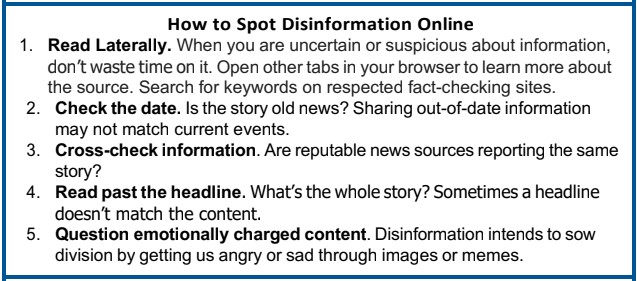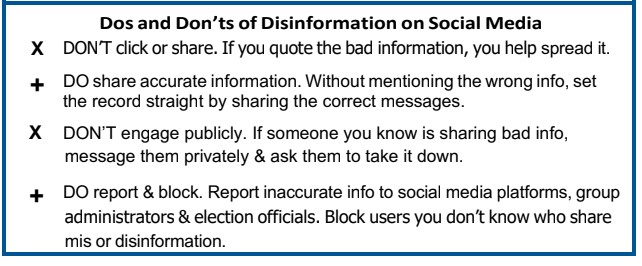



Fact-Checking . . . . . . . . . . . .
Do you need help determining what is fact and what is fiction? Here are some reliable sources that sift through the hype and fabrications:
● Media Bias Fact Check (MBFC)
○ The most comprehensive media bias resource on the internet. Currently, 7500+ media sources, journalists, and politicians are listed in their database. Sources rated very high or high on factual reporting have proper sourcing and a clean fact-check record. mediabiasfactcheck.com
● The International Fact-Checking Network (IFCN)
o To be deemed compliant with IFCN principles, an organization must exhibit a commitment to nonpartisanship and fairness, standards and transparency of sources, transparency about their funding sources, transparency of methodology, and a commitment to open and honest corrections. Some of the verified signatories of the IFCN:
AP Fact Check focuses on fact-checking political claims and publishes “Not Real News: A Look at What Didn’t Happen This Week.” MBFC rates The Associated Press borders on least-biased and left- biased, but very high on factual accuracy. apnews.com/ap-fact-check
FactCheck.org monitors the factual accuracy of TV ads, debates, speeches, interviews, and news releases. MBFC rates it as dead-center, least biased, and very high on factual reporting.
PolitiFact.com is among the least biased IFCN sites. It leans slightly left of center and ranks high on factual reporting of the accuracy of claims by elected officials and others who speak up in American politics.
Science Feedback reviews climate-related and health and medical claims. Their fact-checkers are PhDs with recently published articles in top-tier peer-reviewed science journals, making this the best fact- checker for science-related claims. science.feedback.org
• SciCheck.org
o A nonpartisan, nonprofit “consumer advocate” focusing exclusively on false and misleading scientific claims made by partisans to influence public policy. It is the science arm of FactCheck.org and is a project of the Annenberg Public Policy Center of the University of Pennsylvania.
• Ballotpedia.org
o This is a nonprofit and nonpartisan encyclopedia of American politics and elections. It is designed to connect people to politics utilizing a neutral point-of-view philosophy. MBFC rates it as dead-center, least biased, and very high on factual reporting.
● michigan.gov/sos/faqs/elections-and-campaign-finance/fact-checks
○ This is a State of Michigan-based website formed to provide Michiganders with accurate and truthful election information.
● Media Wise Teen Fact-Checking Network (TFCN) www.poynter.org/news/tfcn/
- Publishes fact-checks for teenagers, by teenagers. Learn from amazing kids!
● Bad News – www.getbadnews.com
○ An online game intended to build user understanding of the techniques involved in disseminating disinformation by exposing players to fake news tactics.
● News Literacy Project – newslit.org
○ The News Literacy Project, a nonpartisan education nonprofit, is building a national movement to advance the practice of news literacy throughout American society, creating better informed, more engaged, and more empowered individuals — and ultimately a stronger democracy.
● Allsides – allsides.com
○ Allsides is a tool that gives the user points of view from the Right, Center, and Left. They have rated media sources to let you know from which point of view they report.
● PBS – A Citizen’s Guide to Preserving Democracy – Video
○ A video based on Richard Haass’ best-selling book “The Bill of Obligations: The Ten Habits of Good Citizens.” Hari Sreenivasan and Dr. Haass explore how Americans are working towards strengthening democracy and renewing engaged citizenry. pbs.org/show/a-citizens-guide-to-preserving-democracy/